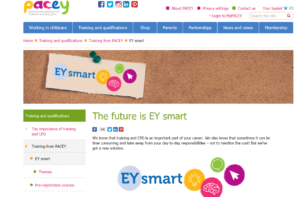
We understand people are leading quite difficult lives at the moment and send all our readers our very best wishes. One thing that has become very apparent over the last few weeks is how, as a society, we have come to rely on certain members of the workforce. There have been many discussions around how, once things get back to normal, we need to consider the status we give to those whose professions we have come to rely on. Included within this group are those who work with young children in different capacities. We thought it would be good therefore to highlight in this month’s blog a new resource for the sector. It has been created by PACEY (Professional Association for Childcare and Early Years) who have been advised and supported by our very own John Parry, senior lecturer in Early Childhood, here at the Open University. PACEY is an organisation which represents childminders and practitioners and they approached the Early Childhood team to support them in putting together some accessible CPD training for the sector.
Q: John can you tell us how this project, and your involvement, came about?
The Early Childhood team at the Open University have a long-standing connection with PACEY; for example, in the past we have been a critical friend to support them with the writing of mini courses. They had already a successful ‘Business Smart’ programme with free access for their 40,000 plus members. They now wanted to provide a learning tool which focused on developing practice through self-evaluation.
Q: Why do you feel this is such an important resource?
It is a user-friendly resource which can be accessed through a mobile phone to enable practitioners to build up their knowledge about early years practice by engaging in bite size learning. The resource does reference ideas familiar to practitioners from the EYFS but it also goes beyond these key ideas to support practitioners’ professional development. For example, there are units on outside play, personal care, time to eat and transitions. Each unit only takes about 10 mins and includes films, mini quizzes and self-reflection. Each practitioner can build up a learner profile and eventually receive a certificate of their learning
Q: What can we expect if we register to use the resource?
It is suitable for a range of practitioners working in a variety of contexts. So a childminder, teaching assistant or a room leader will all find something worthwhile. When you register you choose both the appropriate pathway, depending on your role, and the themes you are interested in. All the units will help you to develop your early years practice with no time pressure or specific timeframes when units have to be completed by.
Q: Any next steps?
There are two stages to the resource. This first stage which is presently available focuses predominantly on those aspects of the EYFS which will remain the same after the revised framework comes into place. The second stage, looking at wider aspects of early years practice, is currently scheduled to be available in September. All the content of both stages has been reviewed by a steering group made up of a diverse range of stakeholders including the Department for Education and Ofsted.
Many thanks John for telling us about this great initiative. If you would like to explore the resource, you can do so on the PACEY website. We’d love to know what you think!
